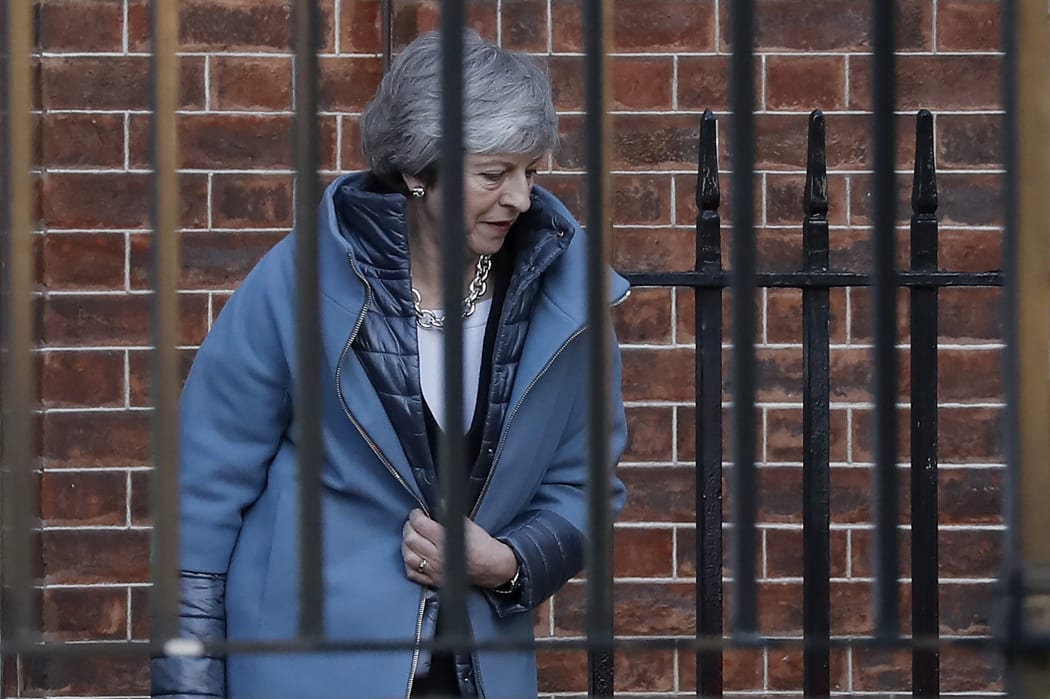By David Townsend*
Opinion - According to BBC experts and others in the UK's House of Commons and Lords, Theresa May's government has now suffered 10 defeats over its Brexit policy.

Britain's Prime Minister Theresa May leaves from the rear of 10 Downing Street in London on February 14, 2019 ahead of a vote on amendments to the Brexit withdrawal bill. Photo: AFP
This one today was not so overwhelming (a mere 45-vote loss) as the massive rejection of her whole plan in January by 230 votes.
Then, true to form, the prime minister got up off the canvas and agreed to revisit various parts of her plan - previously agreed with the European Union (EU) - concentrating on the "Irish backstop" in particular.
The issue: How to manage the customs arrangements on the land border between the Irish Republic - which is not leaving the EU - and Northern Ireland part of departing Britain.
This until the final withdrawal arrangements are agreed. Yes, possibly more years away. For those on the far right of her party any backstop is too long.
And of course the other major aim is to keep Mrs May's slender majority in Parliament on side. Particularly her Democratic Unionist Party support party from Northern Ireland.

EU officials have repeatedly made it clear that there can be no favours given to a departing EU member at the expense of a remaining member. Photo: 123rf
Since that January vote massacre, Mrs May's past few weeks, and those of her senior ministers, have been spent telephoning and talking to EU officials to see if they will change their minds and policy and grant something special to the UK.
A vague proposal that "alternative arrangements" to the Irish backstop may be the British answer was her new plan. Those arrangements are, it seems, impossible to define and depend on technology yet to be invented. It has been put to the EU.
So far the EU has not obliged. In fact, EU officials have repeatedly made it clear that there can be no favours given to a departing EU member at the expense of a remaining member.
And none that would damage the integrity of the EU's single market and Customs Union, something the British government over the last two years has seemed quite unable to grasp.
Today's Commons vote defeated a motion by the government to approve its waterlogged strategy.
As per the previous defeats the main political parties fractured. There were defections from all sides for and against.
Mrs May did not attend the debate. Assumptions about why varied. Eventually enough knock outs are enough? Avoiding humiliation again? She now has another fortnight to go back to Europe and renegotiate something - anything.
The next scheduled Commons discussion on Brexit is for 27 February.

Anti-Brexit supporters protest outside the Houses of Parliament in London earlier in February. Photo: AFP
Once again, in the debate today Ministers assured the House that Britain will leave on 29 March whatever the terms, as per the legislation rushed through and signed by Mrs May in 2017 following the referendum.
This is despite one of the previous non-binding amendments that was passed in Parliament - a defeat for the government - that a "no deal" was off the table.
Mrs May wants the possibility of a "no deal" to concentrate EU minds. But also UK MPs' minds.
So one concession today was agreement to release - in order to head off another amendment defeat - government assessments of the effects on all aspects of British life of a "no deal". Mostly, it is anticipated, disastrous.
Allegedly overheard in a Brussels bar and reported in the British media, her chief Brexit civil servant negotiator, Olly Robbins, said that the strategy is to keep plugging the rejected plan until almost literally the last minute.
Then offer MPs either the plan or a postponement to leaving the EU. Naturally the PM's office denied the story.
Such a postponement would certainly cause even greater division in Parliament. And particularly in the Conservative Party. There, the mysterious "will of the people" as expressed in the 72 percent non-binding referendum with a 52-48 percent leave majority, has assumed a totemic significance.
Unless Mrs May changes her mind again, here we go round the EU mulberry bush continues at the end of this month.
* David Townsend is an ex-UK Parliamentary Labour candidate, a former Labour ministerial speech writer and special adviser and contributor to The Guardian, The Independent and The Times.





